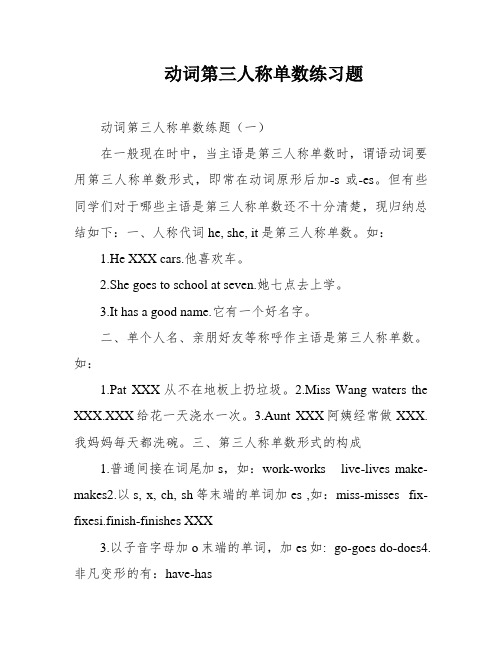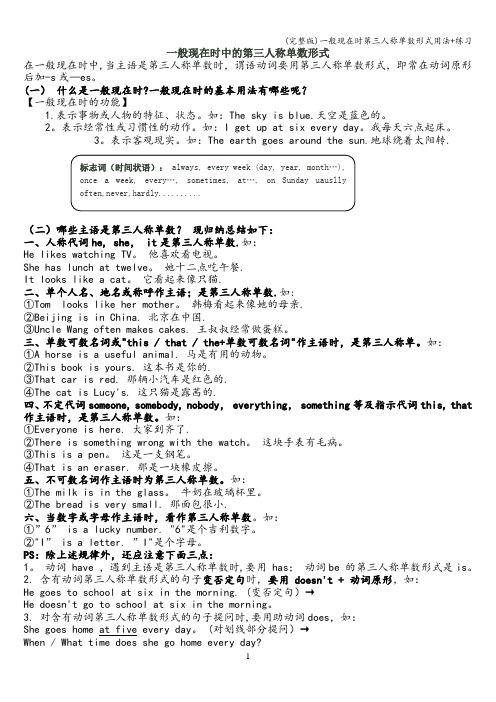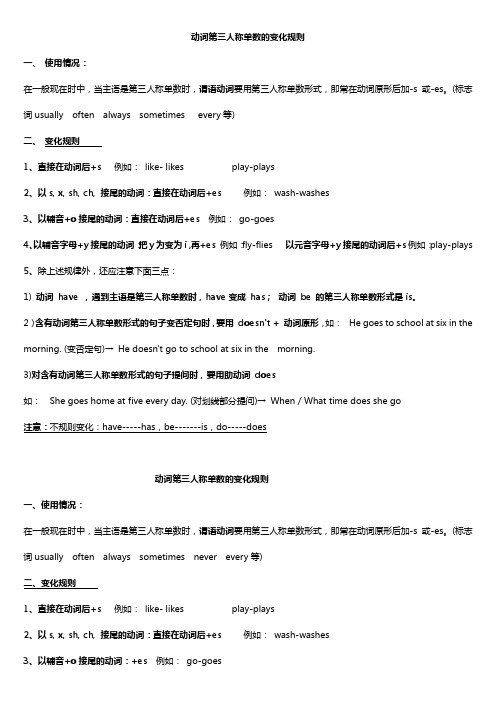(完整版)一般现在时第三人称单数形式用法+练习
动词第三人称单数练习题

动词第三人称单数练习题动词第三人称单数练题(一)在一般现在时中,当主语是第三人称单数时,谓语动词要用第三人称单数形式,即常在动词原形后加-s或-es。
但有些同学们对于哪些主语是第三人称单数还不十分清楚,现归纳总结如下:一、人称代词he, she, it是第三人称单数。
如:1.He XXX cars.他喜欢车。
2.She goes to school at seven.她七点去上学。
3.It has a good name.它有一个好名字。
二、单个人名、亲朋好友等称呼作主语是第三人称单数。
如:1.Pat XXX从不在地板上扔垃圾。
2.Miss Wang waters the XXX.XXX给花一天浇水一次。
3.Aunt XXX阿姨经常做XXX.我妈妈每天都洗碗。
三、第三人称单数形式的构成1.普通间接在词尾加s,如:work-works live-lives make-makes2.以s, x, ch, sh等末端的单词加es ,如:miss-misses fix-fixesi.finish-finishes XXX3.以子音字母加o末端的单词,加es如: go-goes do-does4.非凡变形的有:have-has四、问句:问句中遇到第三人称单数时,需要用助动词does,动词变为原形。
What does she like?When XXX?How often does your sister comb her hair?操演1、将括号里动词的恰当方式填入横线上。
1. I ________ XXX)2. He _________ in the corridors. (run)3. She ___________ her face once a day. (wash)4. They ____________ their teeth once a day. (brush)5. You ___________ up your clothes once a day. (hang)6. We____________ our home work once a day. (finish)7. He____________ rubbish in the classroom. (throw)8. She_____________ rubbish on the floor. (throw)9. I_____________ rubbish in the bin. (throw)10. They ___________ the table once a day. (set)11. Peter never _________ in the corridors. (run)12. Mary usually _________ the table. (set)13. Pat and Ken _________ the plants in the morning. (water)14. The boy __________ his hair once a day. (comb)15. Miss Cheng _________ TV at home. (watch)16. My sister __________ XXX(pack)17. My mother _________ dinner for me. (cook)18. My parents _________ the house at Chinese New Year. (clean)19. My teachers _________ us some gifts. (give)20. My friends _________ the table with me. (set)操演2、挑选精确的单词填到括号里。
一般现在时用法及专项练习

一般现在时(the simple present tense)一、定义是一种英语语法形式,表示规律性、通常性、习惯性、真理性的动作或状态。
二、结构(一)肯定句1. 主语 + be 动词(am/is/are)+ 其他。
例如:I am a student.(我是一名学生。
)2. 主语 + 动词原形。
例如:We play basketball on weekends.(我们在周末打篮球。
)3.主语(第三人称单数)+动词第三人称单数形式。
一般在动词词尾加 -s 或 -es。
例如:He plays football after school.(他放学后踢足球。
)Tom usually goes to school at 7:30.(汤姆通常7点半去学校。
)(二)否定句1. 主语 + be 动词(am/is/are)not +其他。
例如:I am not a student.(我不是一名学生。
)2. 主语 + do not(don’t) +动词原形。
例如:We do not play basketball on weekends.(我们周末不打篮球。
)3.主语(第三人称单数)does not(doesn’t )+动词原形。
例如:He does not play football after school.(他放学后不踢足球。
)(三)一般疑问句1. Be动词+主语+其他?例如:Is she a student?(她是学生吗?)2. Do/Does + 主语 + 动词原形?例如:Do you play football after school? (你放学后踢足球吗?)Does he work here? (他在这里工作吗?)三、用法1. 描述习惯或重复动作:常与表示频率的时间状语连用。
例如:I get up at 6 o'clock every morning. (我每天早上六点起床。
)He goes to school by bus. (他乘公共汽车上学。
一般现在时的三单练习题

一般现在时的三单练习题一般现在时是英语中最基本的时态之一。
它用于描述经常性的活动、事实和真理,以及当前的情况、状态和感受。
一般现在时的主语为第三人称单数时,动词需要加上-s或-es 结尾。
下面是一些练习题,帮助巩固对一般现在时的理解。
练习题1:1. My sister _________ (work) at a hospital.2. John _________ (like) coffee with breakfast.3. The sun _________ (rise) in the east.4. They _________ (play) basketball every Saturday.5. Sarah _________ (watch) TV in the evening.参考答案:1. works2. likes3. rises4. play5. watches练习题2:1. Mark usually _________ (go) to bed early.2. The cat _________ (drink) milk every morning.3. We _________ (have) lunch at 12 o'clock.4. The train _________ (leave) at 8:30 a.m.5. She _________ (read) a book before going to sleep.参考答案:2. drinks3. have4. leaves5. reads练习题3:1. The Earth _________ (revolve) around the sun.2. He _________ (teach) English at a high school.3. They _________ (visit) their grandparents every summer.4. I _________ (listen) to music in my free time.5. Tom _________ (play) the guitar very well.参考答案:1. revolves2. teaches3. visit4. listen5. plays练习题4:1. Birds _________ (fly) in the sky.2. The company _________ (produce) high-quality products.3. We _________ (study) English every day.4. My parents _________ (take) a walk after dinner.5. She _________ (dance) ballet in the evening.参考答案:1. fly2. produces4. take5. dances练习题5:1. The bus _________ (arrive) at 9 a.m. every day.2. I usually _________ (go) to the gym in the morning.3. They _________ (eat) breakfast together every Sunday.4. The company _________ (close) at 5 p.m.5. She _________ (play) tennis on Tuesdays.参考答案:1. arrives2. go3. eat4. closes5. plays以上是几个关于一般现在时的练习题,通过练习可以更好地理解和运用一般现在时的用法。
英语一般现在时,第三人称单数,助动词do、does专项练习和答案

助动词do,does的练习●do用于当主语是第一人称I,第二人称you及复数时(复数包括we,they,these,those及两个以上的人或者事物。
●does用于当主语是第三人称单数时(第三人称包括she,he,it,this,that,单独的事物或者人名等)。
含有实义动词的句型结构变换一、肯定陈述句1.当主语是I,you及复数时,谓语动词用原型。
Eg.I know it.(Eg.表示例如的意思)They have two volleyballs.Tina and Tom like ice cream.2. 当主语是第三人称单数时(第三人称包括she,he,it,this,that,单独的事物或者人名等)。
谓语动词要变为第三人称单数形式。
P98特别要注意have—hasEg.She has a set of keys.He knows my name.Tom needs a computer game.二、肯定陈述句变换成否定陈述句1.当主语是I,you及复数时,在谓语动词前加do not=don’tEg.I don’t know it.They don’t have two volleyballs.Tina and Tom don’t like ice cream.2.当主语是第三人称单数时,在谓语动词前加does not=doesn’t,谓语动词打回原型Eg.She doesn’t have a set of keys.He doesn’t know my name.Tom doesn’t need a computer game.三、肯定陈述句变换成一般疑问句采用“一加二变三问号”。
一加:当主语是I,you及复数时,在句子开头加do;当主语是第三人称单数时(第三人称包括she,he,it,this,that,单独的事物或者人名等),在句子开头加does;二变:变大小写;第一人称变为第二人称(I/we变为you,my/our变为your);当主语是第三人称单数时,谓语动词要打回原型。
一般现在时(第三人称单数形式_)及练习

般现在时(第三人称单数形式 )Hello, boys and girls我是一般现在时,你们想知道我的故事吗Let me tellyou!首先,介绍我的本领。
我的本领有三样:1.表示事物或人物的特征、状态。
如:The sky is blue天空是蓝色的。
2.表示经常性或习惯性的动作。
如:I get up at six every day我每天六点起床。
3.表示客观现实。
如:The earth goes aro und the sun 地球绕着太阳转。
第二,请看我的面目--构成:1.b e动词:主语+be(am ,is ,are)+其它。
如:I am a boy我是一个男孩。
2.行为动词:主语+行为动词(+其它)。
如:We study En glish我们学习英语。
当主语为第三人称单数(he, she ,it)时,三单变化:1.多数在动词后加s,play—plays like —likes2.以s,x,sh,ch,o 结尾的动词加es go—goes wash —washes4.以辅音字母加y 结尾,把y 改i 再加es,fly—flies 。
元音字母加y 结尾的,直接加s,play-plays 。
5.特殊:have-has第三,我的变化--否定句、一般疑问句、特殊疑问句:1.be 动词的变化。
否定句:主语+ be + not +其它。
如:He is not a worker他不是工人。
一般疑问句:Be +主语+其它。
如:-Are you a student -Yes. I am. / No, I'm not.特殊疑问句:疑问词+一般疑问句。
如:Where is my bike2.行为动词的变化。
否定句:主语+ don't( doesn't ) +动词原形(+其它)。
如:I don't like bread. 当主语为第三人称单数时,要用doesn't 构成否定句。
第三人称单数及动词第三人称单数形式变化规则(附练习及答案)

第三人称单数及动词第三人称单数形式变化规则Ⅰ. 第三人称单数主语归纳在一般现在时中,当主语是第三人称单数时,谓语动词要用第三人称单数形式,即常在动词原形后加-s或-es。
现将第三人称单数主语归纳总结如下:Ⅱ. 动词第三人称单数形式变化规则练习及答案一、写出下列动词的第三人称单数。
drink _______ go _______ stay ________ make ________ pass _______ carry_______ come ________ watch _______ fly ________ study_______ brush _______ teach _______ wash_______ guess______ play _______ finish _______二、用括号内动词的适当形式填空。
1. He often ________ (have) dinner at home.2. We _______ (not watch) TV on Monday.3. Nick _______ (not go) to the zoo on Sunday.4. ______ they ________ (like) the World Cup?5. What _______they often _______ (do) on Saturdays?6. _______ your parents _______ (read) newspapers every day?7. The girl _______ (teach) us English on Sundays.8. She and I ________ (take) a walk together every evening.9. There ________ (be) some water in the bottle.10. My aunt _______ (look) after her baby carefully.11. The child often _______ (watch) TV in the evening.12. Su Hai and Su Yang _______ (have) eight lessons this term.答案:一、写出下列动词的第三人称单数。
(完整版)一般现在时第三人称单数形式用法+练习

一般现在时中的第三人称单数形式在一般现在时中,当主语是第三人称单数时,谓语动词要用第三人称单数形式,即常在动词原形后加-s或—es。
(一)什么是一般现在时?一般现在时的基本用法有哪些呢?【一般现在时的功能】1.表示事物或人物的特征、状态。
如:The sky is blue.天空是蓝色的。
2。
表示经常性或习惯性的动作。
如:I get up at six every day。
我每天六点起床。
3。
表示客观现实。
如:The earth goes around the sun.地球绕着太阳转.(二)哪些主语是第三人称单数?现归纳总结如下:一、人称代词he, she, it是第三人称单数.如:He likes watching TV。
他喜欢看电视。
She has lunch at twelve。
她十二点吃午餐.It looks like a cat。
它看起来像只猫.二、单个人名、地名或称呼作主语;是第三人称单数.如:①Tom looks like her mother。
韩梅看起来像她的母亲.②Beijing is in China. 北京在中国.③Uncle Wang often makes cakes. 王叔叔经常做蛋糕。
三、单数可数名词或"this / that / the+单数可数名词"作主语时,是第三人称单。
如:①A horse is a useful animal. 马是有用的动物。
②This book is yours. 这本书是你的.③That car is red. 那辆小汽车是红色的.④The cat is Lucy's. 这只猫是露茜的.四、不定代词someone, somebody, nobody, everything, something等及指示代词this, that 作主语时,是第三人称单数。
如:①Everyone is here. 大家到齐了.②There is something wrong with the watch。
动词第三人称单数的变化规则及练习

动词第三人称单数的变化规则一、使用情况:在一般现在时中,当主语是第三人称单数时,谓语动词要用第三人称单数形式,即常在动词原形后加-s或-es。
(标志词usually often always sometimes every等)二、变化规则1、直接在动词后+s 例如:like- likes play-plays2、以s, x, sh, ch, 接尾的动词:直接在动词后+es 例如:wash-washes3、以辅音+o接尾的动词:直接在动词后+es 例如:go-goes4、以辅音字母+y接尾的动词:把y为变为i,再+es 例如:fly-flies 以元音字母+y接尾的动词后+s例如:play-plays5、除上述规律外,还应注意下面三点:1)动词have ,遇到主语是第三人称单数时,have变成has;动词be 的第三人称单数形式是is。
2)含有动词第三人称单数形式的句子变否定句时,要用doesn't + 动词原形,如:He goes to school at six in the morning. (变否定句)→He doesn't go to school at six in the morning.3)对含有动词第三人称单数形式的句子提问时,要用助动词does如:She goes home at five every day. (对划线部分提问)→When / What time does she go注意:不规则变化:have-----has,be-------is,do-----does动词第三人称单数的变化规则一、使用情况:在一般现在时中,当主语是第三人称单数时,谓语动词要用第三人称单数形式,即常在动词原形后加-s或-es。
(标志词usually often always sometimes never every等)二、变化规则1、直接在动词后+s 例如:like- likes play-plays2、以s, x, sh, ch, 接尾的动词:直接在动词后+es 例如:wash-washes3、以辅音+o接尾的动词:+es 例如:go-goes4、以辅音字母+y接尾的动词:把y变为i,再+es 例如:fly-flies 以元音字母+y接尾的动词后+s例如:play-plays5、除上述规律外,还应注意下面三点:1)动词have ,遇到主语是第三人称单数时,have变成has;动词be 的第三人称单数形式是is。
- 1、下载文档前请自行甄别文档内容的完整性,平台不提供额外的编辑、内容补充、找答案等附加服务。
- 2、"仅部分预览"的文档,不可在线预览部分如存在完整性等问题,可反馈申请退款(可完整预览的文档不适用该条件!)。
- 3、如文档侵犯您的权益,请联系客服反馈,我们会尽快为您处理(人工客服工作时间:9:00-18:30)。
一般现在时中的第三人称单数形式
在一般现在时中,当主语是第三人称单数时,谓语动词要用第三人称单数形式,即常在动词原形后加-s或-es。
(一)什么是一般现在时?一般现在时的基本用法有哪些呢?
【一般现在时的功能】
1.表示事物或人物的特征、状态。
如:The sky is blue.天空是蓝色的。
2.表示经常性或习惯性的动作。
如:I get up at six every day.我每天六点起床。
阳转。
(二)哪些主语是第三人称单数? 现归纳总结如下:
一、人称代词he, she, it是第三人称单数。
如:
He likes watching TV. 他喜欢看电视。
She has lunch at twelve. 她十二点吃午餐。
It looks like a cat. 它看起来像只猫。
二、单个人名、地名或称呼作主语;是第三人称单数。
如:
①Tom looks like her mother. 韩梅看起来像她的母亲。
②Beijing is in China. 北京在中国。
③Uncle Wang often makes cakes. 王叔叔经常做蛋糕。
三、单数可数名词或"this / that / the+单数可数名词"作主语时,是第三人称单。
如:
①A horse is a useful animal. 马是有用的动物。
②This book is yours. 这本书是你的。
③That car is red. 那辆小汽车是红色的。
④The cat is Lucy's. 这只猫是露茜的。
四、不定代词someone, somebody, nobody, everything, something等及指示代词this, that作主语时,是第三人称单数。
如:
①Everyone is here. 大家到齐了。
②There is something wrong with the watch. 这块手表有毛病。
③This is a pen. 这是一支钢笔。
④That is an eraser. 那是一块橡皮擦。
五、不可数名词作主语时为第三人称单数。
如:
①The milk is in the glass. 牛奶在玻璃杯里。
②The bread is very small. 那面包很小。
六、当数字或字母作主语时,看作第三人称单数。
如:
①"6" is a lucky number. "6"是个吉利数字。
②"I" is a letter. "I"是个字母。
PS:除上述规律外,还应注意下面三点:
1. 动词 have ,遇到主语是第三人称单数时,要用 has;动词be 的第三人称单数形式是is。
2. 含有动词第三人称单数形式的句子变否定句时,要用 doesn't + 动词原形,如:He goes to school at six in the morning. (变否定句)→
He doesn't go to school at six in the morning.
3. 对含有动词第三人称单数形式的句子提问时,要用助动词does,如:
She goes home at five every day. (对划线部分提问)→
When / What time does she go home every day?
(三)一般现在时------动词第三人称单数形式构成规则(一般现在时中主语时第三人称
1、大多数动词在词尾加“S”如:
①stop-stops make-makes read-reads play-plays
2、以辅音字母加“y”结尾的,要先将“y”变为“i”,然后在加“es”;以元音字母加“y”结尾的,直接加“S”如:
fly-flies carry-carries study-studies worry-
worries
3、以“s, x, ch, sh”结尾的,在词尾加“es”,发音为如:
teach-teaches watch-watches
4、以“o”结尾的动词,加“es”,如:
go-goes do-does
5、以不发音字母“e”结尾的开音节词,加“s”如: close-closes [iz]
6、特殊:
○1. be动词包括:am, is, are。
第三人称单数用 is;过去式为 was;复数用are,过去式为were.
○2. 动词 have ,遇到主语是第三人称单数时,要用 has;动词 be 的第三人称单数形式is。
(四)巩固练习题:
一、写出下列动词的第三人称单数形式:
sit-- guess-- die-- go--
rush-- reach-- touch-- brush--
fly-- copy-- say-- run--
do-- fix-- live-- cry--
enjoy-- have-- wish-- play--
tie-- teach-- buy-- study--
drink-- go-- stay-- make--
look-- carry-- come-- watch--
plant-- fly -- do--
二、用括号内动词的适当形式填空。
1. He often ________(have) dinner at home.
2. Daniel and Tommy _______(be) in Class One.
3. We _______(not watch) TV on Monday.
4. Nick _______(not go) to the zoo on Sunday.
5. ______ they ________(like) the World Cup?
6. What _______they often _______(do) on Saturdays?
7. _______ your parents _______(read) newspapers every day?
8. The girl _______(teach) us English on Sundays.
9. She and I ________(take) a walk together every evening.
10. There ________(be) some water in the bottle.
11. Mike _______(like) cooking.
12. They _______(have) the same hobby.
13. My aunt _______(look) after her baby carefully.
14. You always _______(do) your homework well.
15. I _______(be) ill. I’m staying in bed.
16. She _______(go) to school from Monday to Friday.
17. Liu Tao _______(do) not like PE.
18. The child often _______(watch) TV in the evening.
19. Su Hai and Su Yang _______(have) eight lessons this term.
20. -What day _______(be) it today?
-It’s Saturday
三、观察下面两组句子,注意区分do和does,don’t和doesn’t。
I go to school every day. I don't go to school every day.
He goes to school every day. He doesn't go to school every day.
Do you go to school every day? Yes, I do. (No, I don't)
Does he go to school every day? Yes, he does. (No, he doesn't)
注:
(1)肯定句变否定句,第三人称单数把does变doesn’t (does not),其余把do变don’t(do not),后面跟动词原形.(一请一还原)
(2)变为一般疑问句,要在句首加"do" 或does ,这取决于主语是否第三人称单数。
课堂练习:把下列句子改成一般疑问句和否定句。
1.I usually get up at six o’clock.(并作肯定回答)
2. We usually write e-mails on Saturday evening.(并作否定回答)
.
3. They have the same hobby.(并作肯定回答)
.
4.Suhai and Su yang like listening to music after school.(并作否定回答)
5.Helen usually watches TV in the evening.(并作肯定回答)。
